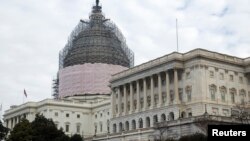The U.S. House of Representatives has rescued President Barack Obama’s ambitious Asia-Pacific trade agenda for the time being, but its future remains uncertain.
After the president’s free-trade agenda suffered a stunning defeat last week, the House voted 218-208 Thursday to pass legislation to give presidents the power to submit trade deals to Congress for an up-or-down vote without amendments.
Most Republicans joined with pro-trade Democrats to pass a stand-alone Trade Promotion Authority, or TPA, bill. The House separated TPA from a related measure, Trade Adjustment Assistance, or TAA, the aim of which is to help workers who are hurt by international trade agreements.
The TAA was unexpectedly defeated last Friday by a large number of the president’s fellow Democrats voting against it in a strategic move to sink trade promotion authority.
Republican leaders in the House and the Senate say they are committed to passing both the TPA and the TAA, but a number of Democrats say they do not see a path to the workers' assistance bill passing in the House.
Bill faces uncertain future in Senate
The path forward for so-called “fast-track” authority for the president to wrap up trade agreements is uncertain. The TPA bill just passed by the House goes back to the Senate, where all eyes will be on pro-trade Senate Democrats. Some of them have said they will not vote for it without assurances that the workers relief bill will pass in both chambers – a difficult undertaking.
Asked about the complicated maneuvering on the different bills, with Republican leaders collaborating with the White House to push free trade, Republican House Speaker John Boehner called it “bizarre.”
On the House floor Thursday, pro-trade Republicans and Democrats on the one side and anti-trade agreement Democrats on the other side had their second heated debate on trade promotion authority in two weeks.
Republican Representative Paul Ryan started the debate by saying, “Welcome back!” Ryan said it is not complicated to understand why America needs to be a part of multinational trade agreements: “Ninety-five percent of the world’s consumers - they don’t live in America, they live in other countries. And if we want to make more things here, and sell them there, then we need to tear down those trade barriers that make America’s goods and services more expensive,” he said.
Some Democrats agreed; but other Democrats, labor unions and environmentalists strongly oppose fast-track authority, saying past free trade agreements have resulted in thousands of American jobs being sent overseas.
Democratic Representative Brad Sherman said, “This bill is catastrophic for our national security. It hollows out our manufacturing base. And it is the greatest gift to China that we could possibly make.”
Sherman said the bill formally sanctions China’s currency manipulation.
Passionate debates on the merits of free trade agreements are likely to continue in the House and Senate next week.




